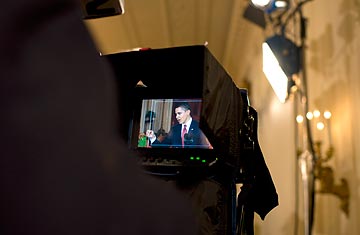
President Barack Obama appears on a television camera monitor during a news conference.
In the argument between the White House and Fox News over whether the cable channel is a conservative mouthpiece, you would think that Fox's viewers would have its back. Not entirely. In an Oct. 29 Pew Research Center survey, TV-news viewers named Fox the most ideological outlet--and 48% of Fox's own viewers called it "mostly conservative" (27% of Fox fans said it was "neither in particular," while 17% said it was "mostly liberal," suggesting that pollsters called G. Gordon Liddy's house more than once).
Now that's not exactly the same as the White House's charge that Fox is essentially a political operation. But it suggests that those "fair and balanced" ads don't fool the people actually watching the stuff. Fox isn't alone, though: the survey showed that far more viewers saw ABC, CBS, CNN, MSNBC and NBC as liberal than saw them as conservative.
All of which underlines the obvious: the news audience, if not news itself, is getting more polarized. But categories like Pew's "liberal," "conservative" and "neither" imply that our society is as simplistic about media bias as we are about politics (when in fact both involve nuanced positions), and they overlook the most significant bias out there: moderate bias.
As anyone following health reform knows, centrism is a political position too. And you see moderate bias--i.e., a preference for centrism--whenever a news outlet assumes that the truth must be "somewhere in the middle." You see it whenever an organization decides that "balance" requires equal weight for an opposing position, however specious: "Some, however, believe global warming is a myth." (Moderate bias would also require me to find a countervailing liberal position and pretend that it is equivalent to global-warming denial. Sorry.)
Often, moderate bias is just the result of caution, but the effect is to bolster centrist political positions--not least by implying that they are not political positions at all but occupy a happy medium between the nutjobs. Meanwhile, conservatives see moderate bias as liberal, and liberals see it as conservative--letting journalists conclude that it's not bias at all.
Moderate bias also grows from a related phenomenon: status-quo bias. Journalists, like anyone, have a built-in bias toward believing that what was true yesterday will be true tomorrow. Establishment news outlets grow cozy and comfortable with other establishments. One reason some journalists insufficiently questioned the run-up to the Iraq war and underestimated the housing bubble was that they listened to their usual, credentialed sources--and the history of the past decade is the history of the experts being wrong.
And especially in the top ranks of journalism, there's class bias. If I wanted to look at potential conflicts of interest in reporters covering bank bailouts, for instance, I'd be less concerned about their party affiliation than whether they're based (like me) in New York City, where the economy lives and dies on finance.
